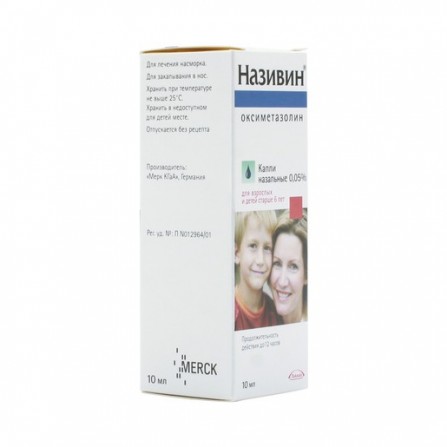Nazivin nasal drops of 0.05% 10 ml
Condition: New product
1000 Items
Rating:
Be the first to write a review!

More info
Active ingredients
Oxymetazoline
Release form
Drops
Composition
Active ingredient: Oxymetazoline. Excipients: benzalkonium chloride 50% solution, disodium edetate dihydrate, sodium dihydrogen phosphate dihydrate, sodium hydrogen phosphate dihydrate, sodium hydroxide 1 M solution, purified water. Concentration of active ingredient (mg): 0, 5 mg
Pharmacological effect
Pharmacological action - vasoconstrictor, alpha-adrenomimetic.
Pharmacokinetics
Oxymetazoline begins to act directly after applying the drug to the mucous membranes. The duration of the vasoconstrictor effect is up to 10 - 12 hours. Systemic absorption of the active ingredient is negligible. Excretion is carried out through the kidneys (more than 2%) and intestines (more than 1%). Half-life is about 35 hours.
Indications
Treatment of acute respiratory diseases accompanied by rhinitis, allergic rhinitis, vasomotor rhinitis, to restore drainage in case of inflammation of the paranasal sinuses, eustachitis, otitis media, to eliminate edema before diagnostic procedures in the nasal passages.
Contraindications
Atrophic rhinitis. angle-closure glaucoma. hypersensitivity to the drug. It is necessary to adhere to the recommended concentrations of the drug, intended for different age categories (see methods of use).
Precautionary measures
After prolonged use or administration of cold remedies containing oxymetazoline, in dosages exceeding those recommended, the general effect on the cardiovascular system and the central nervous system cannot be ruled out. In these cases, the ability to drive a vehicle or equipment may be reduced.
Use during pregnancy and lactation
During pregnancy and breastfeeding, it is not allowed to exceed the recommended dosage. The drug should be used only after a thorough assessment of the ratio of benefits and risks for the mother and fetus.
Dosage and administration
Nazivin 0, 01%, 0, 025% and 0, 05% drops are intended for use in the nose. Adults and children over 6 years of age: apply Nazivin drops 0.05% 1 to 2 drops in each nasal passage 2-3 times a day. Children from 1 year to 6 years: apply drops Nazivina 0, 025% 1 - 2 drops in each nasal passage 2-3 times a day.Children under 1 year: children under the age of 4 weeks appoint 1 drop of Nazivin 0, 01% in each nasal passage 2-3 times a day. From the 5th week of life and up to 1 year - 1 to 2 drops in each nasal passage 2-3 times a day. To ensure the accuracy of the dosage, the Nazivina 0.01% vial of drops has a graduated pipette with marks of the number of drops. For example, if 1 drop is prescribed, the pipette should be filled with a solution to the mark 1. The following procedure is also effective: depending on the age of 1 - 2 drops of a 0.01% solution is applied on cotton wool and wipe nasal passages. Nazivin 0, 01%, 0, 025% and 0, 05% drops should be applied 3 - 5 days. Doses above the recommended can only be used under the supervision of a physician.
Side effects
Sometimes: burning or dry nasal membranes, sneezing. In rare cases: after the effect of the use of Nazivin has passed, a strong feeling of nasal congestion (reactive hyperemia). Multiple overdose with local nasal use sometimes leads to systemic sympathomimetic effects such as increased heart rate (tachycardia) and high blood pressure. In very rare cases, anxiety, insomnia, fatigue, headaches and nausea were observed. Prolonged continuous use of vasoconstrictor drugs can lead to tachyphylaxis, atrophy of the nasal mucosa and recurrent swelling of the nasal mucosa (rhinitis medication).
Overdose
Symptoms (after a significant overdose or inadvertent ingestion): pupillary constriction, nausea, vomiting, cyanosis, fever, tachycardia, arrhythmia, vascular insufficiency, hypertension, respiratory disorders, pulmonary edema, cardiac arrest; in addition, mental disorders may appear, as well as depression of the central nervous system functions, accompanied by drowsiness, lower body temperature, bradycardia, arterial hypotension, respiratory arrest and the possible development of coma. Treatment: gastric lavage, taking activated charcoal and an urgent appeal to the doctor.
Interaction with other drugs
Significant overdose or ingestion of Nazivin and taking tricyclic antidepressants or MAO inhibitors simultaneously or immediately before using Nazivin can lead to an increase in blood pressure.Currently, there are no known cases of drug incompatibility.
special instructions
Prolonged use of decongestants for instillation into the nose can lead to a weakening of their action. Abuse of these agents can cause mucosal atrophy and reactive hyperemia with rhinitis medication, as well as damage to the mucous epithelium and inhibition of epithelial activity. Long-term use and overdose should be avoided.




